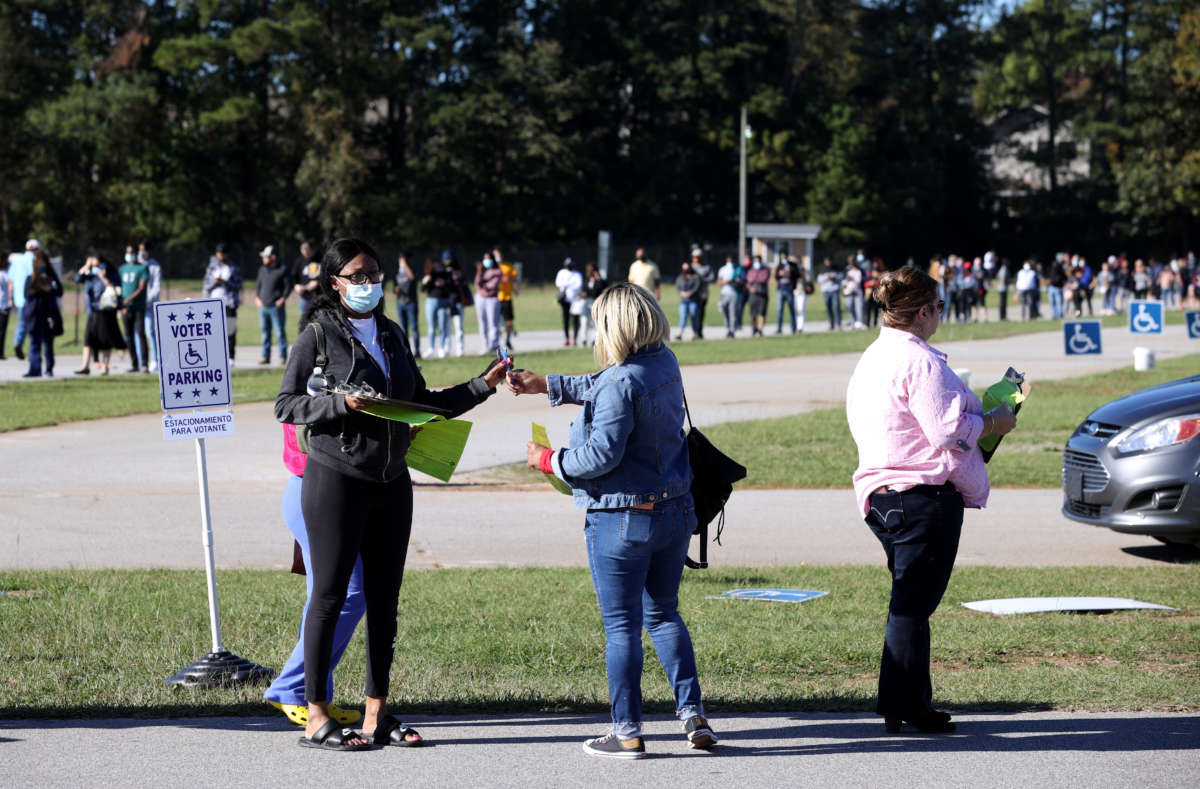After two counties in Georgia sought to purge thousands of voters from registration rolls using unreliable data from national change-of-address forms, a federal judge ruled that the attempt to disenfranchise these voters was improper and illegal.
U.S. District Judge Leslie Abrams Gardner (who is also the sister of former Georgia gubernatorial candidate Stacey Abrams) issued a decision on Monday against the moves by officials in Muscogee County and Ben Hill County to displace residents from being registered to vote. Her decision ensures that more than 4,000 voters will remain registered in those counties, allowing them to vote in upcoming Senate runoff elections in the state scheduled for next week.
Most of those 4,000 voters are from the heavily Democratic-leaning Muscogee County. President-elect Joe Biden, who won the state overall by less than 12,000 votes, won that county by a margin of 24 percent over President Donald Trump. Around 150 voters will see their names restored to registration rolls in Ben Hill County, which Trump won over Biden by a margin of around 16 percent.
Both counties’ boards relied on purging voters from the rolls under dubious grounds, baselessly arguing that change of address data proved residents had moved from the state without giving proper notice to those who had been affected. Indeed, the attorney advising the Ben Hill County board said at the time when voters were purged that the purged names “could not be confirmed, the list would not be admissible in court, and there were better remedies available” for confirming if voters were properly registered or not, Gardner noted in her opinion.
Gardner also stated that the purge was improper for another reason: according to the National Voter Registration Act, similar types of removals from voter registration rolls cannot happen within 90 days of an upcoming election.
The case that Gardner ruled on is separate from another effort by four civil rights groups seeking to restore voting rights for nearly 200,000 other residents in Georgia, who were purged from registration rolls prior to this year’s races using similar tactics. That lawsuit is hoping to restore those registrations in time for the January 5 runoff elections.
Though the decision by Gardner only affects around 4,000 voters, it could prove to be critical in the runoff races, which feature Republican incumbent Senators Kelly Loeffler and David Perdue facing off against Democratic challengers Raphael Warnock and Jon Ossoff, respectively. Recent polling for both races is very tight, with aggregated numbers from FiveThirtyEight.com demonstrating they are statistical ties at the moment.
According to that site’s calculations, Perdue is currently ahead of Ossoff by a margin of 0.8 percent, while Warnock leads Loeffler by just 0.1 percent. Both races are well within the margins of error that the site used to make their calculations.
Weeks ago, Georgia surpassed records set for in-person voting for the runoff races. As of this week, around 2.1 million residents in the state have already voted.
The two races are of great national importance, as they will determine which political party will be in control of the U.S. Senate next term. If both Democratic candidates win, there will be a 50-50 tie in the upper chamber of Congress, with Vice President-elect Kamala Harris casting the tie-breaking vote. If just one of the two Republican candidates win, control of the Senate will remain with the GOP.
Our most important fundraising appeal of the year
December is the most critical time of year for Truthout, because our nonprofit news is funded almost entirely by individual donations from readers like you. So before you navigate away, we ask that you take just a second to support Truthout with a tax-deductible donation.
This year is a little different. We are up against a far-reaching, wide-scale attack on press freedom coming from the Trump administration. 2025 was a year of frightening censorship, news industry corporate consolidation, and worsening financial conditions for progressive nonprofits across the board.
We can only resist Trump’s agenda by cultivating a strong base of support. The right-wing mediasphere is funded comfortably by billionaire owners and venture capitalist philanthropists. At Truthout, we have you.
We’ve set an ambitious target for our year-end campaign — a goal of $250,000 to keep up our fight against authoritarianism in 2026. Please take a meaningful action in this fight: make a one-time or monthly donation to Truthout before December 31. If you have the means, please dig deep.
